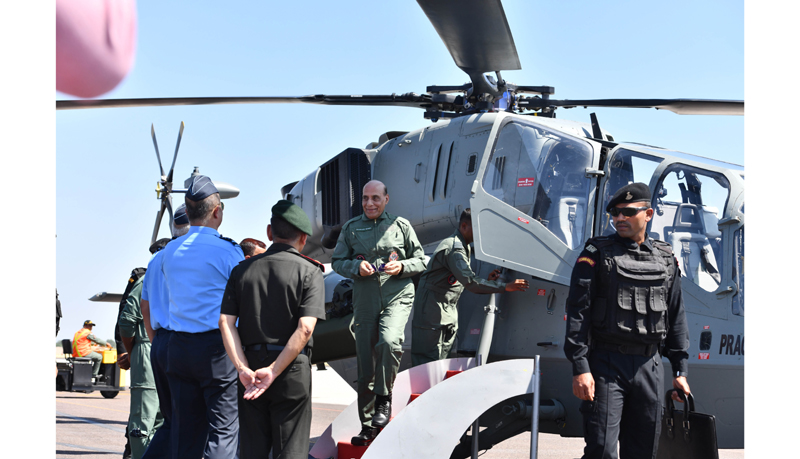
Armed with
air-to-air missiles
JODHPUR, Oct 3:
The Indian Air Force (IAF) today inducted the first fleet of indigenously-built Light Combat Helicopter (LCH), which has been developed primarily for mountain warfare after a requirement for it was felt during the Kargil war in 1999.
Developed by State-run aerospace major Hindustan Aeronautics Ltd (HAL), the 5.8-tonne twin-engine gunship chopper is armed with air-to-air missiles, 20 mm turret guns, rocket systems and other weapons.
The fleet comprising four helicopters was inducted into the IAF at a ceremony at the Jodhpur Air Force Station in presence of Defence Minister Rajnath Singh, Chief of Defence Staff Gen Anil Chauhan, Chief of Air Staff Air Chief Marshal VR Chaudhari and other senior military officials.
The Defence Minister named the helicopter as “Prachand” (fierce) and said the platform, capable of operating in day and night, will add significant edge to the IAF’s combat capabilities as it can hit enemy targets with precision.
Singh, who also flew a sortie on the LCH, said it can operate in all possible conditions, and is among one of the best globally in its class.
The helicopter, with its wide range of missiles and other weapons, can hit enemy infantry, tanks, bunkers, drones and other assets in high-altitude regions, military officials said.
In his address, Singh described induction of the indigenously-built LCH into the IAF as a “momentous occasion” for India’s defence production.
“The IAF has been playing an important role in protecting India’s sovereignty and I am confident that its overall capability will enhance further following induction of LCH,” Singh said in his address.
“We have been focusing on boosting the country’s defence production following certain developments…. Security of the country has been our foremost priority and it will remain so,” he said.
The Defence Minister also complimented the IAF for reposing confidence in indigenously developed platforms.
Air Chief Marshal Chaudhari said the capabilities of LCH is on a par with the helicopters of its class globally.
The helicopters were given a traditional water-canon salute that followed a multi-religious prayer ceremony.
The need for developing a light combat helicopter for mountain warfare was felt during the Kargil War in 1999.
“Subsequently, the IAF and HAL began exploring the possibility of developing the platform with a capacity to carry an adequate weapon load, sufficient fuel and still be capable of operating in the higher reaches of the Himalayan ranges,” said an official.
By mid 2010, the prototype of LCH completed a major flight test and it was deemed to have fulfilled the desired parameters.
In February 2020, the LCH was declared ready for production.
In March, the Prime Minister Narendra Modi-led Cabinet Committee on Security (CCS) approved the procurement of 15 indigenously developed Limited Series Production (LSP) LCH at a cost of Rs 3,887 crore.
The Defence Ministry had said 10 helicopters would be for the IAF and five will be for the Indian Army.
The induction of the chopper comes at a time India and China are locked in a military stand-off in certain friction points in eastern Ladakh.
The LCH has similarities with Advanced Light Helicopter Dhruv. It has a number of stealth features, armoured-protection systems, night attack capability and crash-worthy landing gear for better survivability, officials said.
The LCH is equipped with requisite agility, manoeuvrability, extended range, high altitude performance and all-weather combat capability to perform a range of roles including combat search and rescue (CSAR), destruction of enemy air defence (DEAD) and counter-insurgency (CI) operations.
The helicopter can also be deployed in high-altitude bunker-busting operations, counter-insurgency operations in the jungles and urban environments as well as for supporting ground forces.
The helicopter can also be used against slow-moving aircraft and remotely piloted aircraft (RPAs) of adversaries. Officials said it would be a potent platform to meet the operational requirements of the IAF and the Indian Army.
They said state-of-the-art technologies and systems compatible with stealth features such as reduced visual, aural, radar and IR signatures and crash-worthiness features for better survivability have been integrated into the LCH for deployment in combat roles.
Several key aviation technologies like a glass cockpit and composite airframe structure have been indigenised, they said.
The future series-production version will consist of further modern and indigenous systems, they said.
Four LCH have already been accepted by the IAF. The officials said IAF plans to procure more LCH in the near future.
The helicopter has been tested under stringent operating conditions including at sea level, in desert regions and in Siachen.
The Army has a plan to acquire 95 LCH largely for a combat role in mountains. (PTI)

